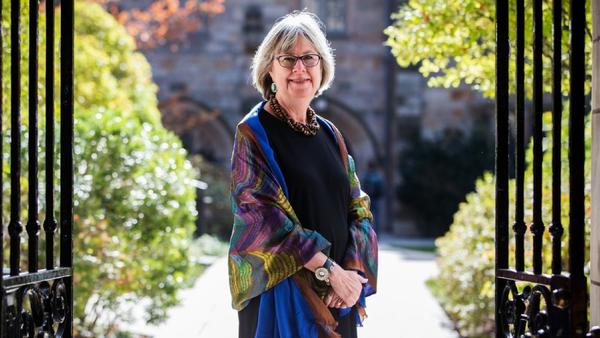A New Kind of Chaplain

What in God's name would Puritan theologian Jonathan Edwards, Yale Class of 1720, think of Sharon Kugler?
In her tenth year as Yale chaplain, she is the first woman, first Catholic and first layperson to serve in that position. Yale was founded, after all, by Protestants for Protestants, and half of its early graduates entered the ministry.
All previous Yale chaplains were Protestant clergy, among them the legendary "Uncle Sid" Lovett and William Sloan Coffin, a prominent political activist. A centerpiece of their duties was preaching in Battell Chapel.
Sharon Kugler has broken the mold. She doesn't proselytize or preach. What she will do, periodically, is have one of those big bouncy castles — more commonly associated with grade school birthday parties set up on campus. She dispenses swag, such as ice cream, wind-up toys, and stress balls, to students who drop by the Chaplain's Office, on the freshman campus, in the basement of Bingham Hall. Most days the office is open until 11 p.m.
Kugler and her staff of nine, including directors of Hindu and Muslim life, organize campus activities, from large religious ceremonies like Diwali, a Hindu celebration that attracts some 500 people to Yale Commons, to secular coloring bees around a small table in the "Breathing Space." Type A Elis apparently like to color, perhaps as an escape from academic rigors. "There are no mistakes in coloring," she points out. Kugler describes her job succinctly as "creative loitering."
If she is not quite like Uncle Sid, she says with a laugh that perhaps her moniker could be "Grandma Sharon." She is 57, with graying hair and five grandchildren.
Nor is she like the outspoken Rev. Coffin. She demurred when asked to discuss religion in a larger context — its role in public life, its relevance to tensions around the world, or the changing ways people worship today. She preferred to focus on her duties at Yale.
She has a kind, optimistic face and has been a chaplain for a quarter century, initially for 14 years at John Hopkins University. She knows the drill. Her master's thesis at Georgetown University, "The Limits and Possibilities of Building a Religiously Plural Community," was used by the U.S. Department of Defense as a training tool for its chaplains. She also teaches a course at the Yale Divinity School.
"The hallmark of a strong Chaplaincy is whether you are visible and accessible,' she says. "Today it's Indigenous Peoples Day on Cross Campus and that's where I want to be. It isn't that things have changed at Yale spiritually; the big questions of meaning and purpose in life are probably the same. But they're experienced by vastly different types of communities now than in your day" (this writer, a Yale grad, never considered dropping in on Rev. Coffin).
Yalies, indeed, have changed. Catholics now are one-quarter of all undergrads. Add in Protestants, and Christians still hold the majority, followed by Jewish students (nearly 15 percent), Muslims (4.3), Hindus (3), and Buddhists (2). There is even a smattering of neo-pagans. William F. Buckley Jr.'s fear — expressed in his 1952 book, "God and Man at Yale," that the university was backsliding into atheism — has proved to be unfounded. Only one in 10 students identify themselves as atheists or agnostics.
Susan Aboeid is a sophomore who, like many students, found Yale overwhelming her freshman year. She visits the Chaplain's Office often to pray in the Muslim Prayer Room and to socialize: "As soon as I would see Chaplain Kugler and hug her, I would feel a sense of peace and tranquility. … I knew that I was in good hands, because I saw how much she cared for our community here at Yale, regardless of faith background."
Believers and unbelievers alike are welcome in the basement of Bingham. Many of Kugler's duties are not religious. She is a cross between a den mother and a camp counselor. Students pop into her office to study, to hang out, or simply to power down in a comfy couch. They may want to talk. Or not.
"Maybe 40 percent of the students who come in to talk want a pastoral conversation," she says. "But for most students it's life stuff, it's the death of a family member, dealing with their own struggles, whether it's a broken heart or they're coming out and they don't know if there's a place for them in their religious communities, or their families." And in a world where religious tensions are rife, Kugler champions tolerance: "I like to think that we cultivate an appreciation for difference, cultivating tools in students so they can comfortably encounter difference and come to a place where they can ask good questions of each other and be respectful of each other."
Kugler, who recently signed on for another five-year hitch, often puts in 12-hour days. She and her husband live in the Chaplain House on campus, where she often hosts official events.
And while she worries about the state of the world, her faith has never wavered. She recalls what a professor once pointed out to her: Eight of the Ten Commandments address how people should treat one another. "It's on us and we often fail miserably," she says.
That said, Sharon Kugler also has a robust appreciation for life's joyful side: "I am tremendously grateful for the moments when I can smile."